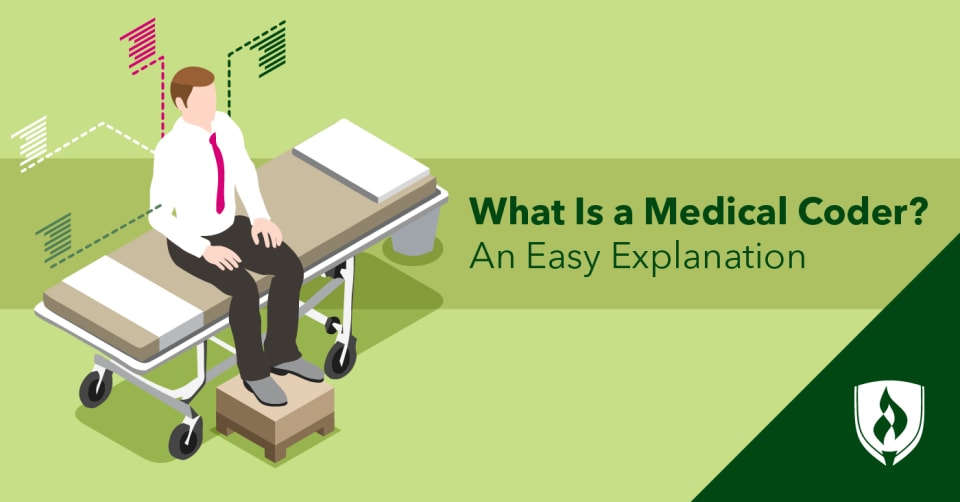A clinical coder plays a crucial role in the healthcare industry by analyzing medical records and assigning detailed numerical codes to each diagnosis, treatment, and procedure performed on a patient. These codes serve as a standardized language that allows healthcare providers, researchers, and insurance companies to track, analyze, and make informed decisions based on patient data. With meticulous attention to detail and an in-depth understanding of medical terminology and coding guidelines, a clinical coder ensures accuracy and completeness in the documentation of patient encounters. The proficiency of a clinical coder greatly impacts the quality of healthcare provided, reimbursement rates, and the overall efficiency of healthcare systems.
What Is a Clinical Coder

This image is property of www.rasmussen.edu.
Definition of a Clinical Coder
A clinical coder is a healthcare professional responsible for translating medical diagnoses, procedures, and treatment details into a standardized system of codes. These codes are used for various purposes, such as medical billing, healthcare management, clinical research, and public health analysis. Clinical coders play a crucial role in ensuring accurate and consistent documentation of patient encounters and are highly valued members of the healthcare team.
Role and Responsibilities
The primary role of a clinical coder is to review healthcare documentation, such as physician notes, test results, and other medical records, and assign the appropriate codes according to coding classification systems. This task requires in-depth knowledge of medical terminology, disease processes, and procedures. Clinical coders also ensure the accuracy and completeness of the coded information, as it directly impacts medical billing, reimbursement, and data analysis.
In addition to coding, clinical coders may be involved in data quality assurance, conducting audits to verify the accuracy of coded information, and identifying any inconsistencies or errors. They may collaborate with healthcare providers, administrators, and insurance companies to clarify documentation and ensure compliance with coding guidelines and regulations. Clinical coders must also stay updated with changes in coding systems, guidelines, and regulations to maintain accuracy and efficiency in their work.
Importance of Clinical Coding
Clinical coding is an essential component of modern healthcare systems due to its pivotal role in various aspects of healthcare delivery and management. Accurate coding facilitates seamless communication between healthcare providers, payers, and researchers, ensuring appropriate billing, reimbursement, and analysis of medical data. Here are some key reasons why clinical coding is vital in the healthcare industry:
- Medical Billing and Reimbursement: Clinical coding forms the basis for medical billing and reimbursement processes. Accurate coding enables healthcare facilities to receive proper payment for services rendered to patients while ensuring compliance with billing regulations and guidelines.
- Clinical Research: Clinical coders provide the data infrastructure necessary for meaningful clinical research. Coded information allows researchers to analyze patient populations, disease patterns, treatment effectiveness, and outcomes, leading to advancements in medical knowledge and improved patient care.
- Healthcare Management: Coded data plays a crucial role in healthcare management by providing insights into healthcare utilization, resource allocation, and quality assessment. By analyzing coded data, healthcare administrators can make informed decisions regarding staffing, equipment, and improvements in patient care processes.
- Public Health and Epidemiology: Clinical coding is vital in public health analysis and epidemiological studies. Coded data can help identify disease trends, monitor public health emergencies, and contribute to disease surveillance efforts. This information is invaluable in developing effective public health policies and interventions.
Given the importance of clinical coding, it is essential to understand the education, training, and skills required to excel in this field.
Education and Training

Qualifications Required
To become a clinical coder, a minimum educational requirement is a high school diploma or equivalent. However, many employers prefer candidates with additional qualifications, such as an associate’s or bachelor’s degree in health information management or a related field. These educational programs provide students with a solid foundation in medical terminology, anatomy, physiology, and healthcare information systems.
Specialized Training
While formal education provides a fundamental understanding of healthcare and coding principles, specialized training in clinical coding is necessary to develop the skills and knowledge required for accurate code assignment. Many organizations offer coding training programs that focus on coding classification systems, such as the International Classification of Diseases (ICD), Current Procedural Terminology (CPT), and the Healthcare Common Procedure Coding System (HCPCS).
Clinical coders may also receive on-the-job training to familiarize themselves with the specific coding guidelines and software used in their healthcare facility. This training includes hands-on practice, feedback, and mentorship from experienced coders to enhance coding proficiency and accuracy.
Professional Certifications
Obtaining professional certifications in clinical coding is highly recommended to demonstrate expertise and enhance career prospects. Certifications, such as the Certified Coding Specialist (CCS) or Certified Professional Coder (CPC), are offered by reputable organizations and require passing a comprehensive exam. These certifications validate the coder’s knowledge and competence in coding systems, guidelines, and ethical considerations.
Certified clinical coders often have a competitive edge in the job market and may be eligible for higher-paying positions or opportunities for advancement in their careers.
Skills and Competencies
Successful clinical coders possess a unique set of skills and competencies that enable them to perform their roles effectively. Here are some essential skills required for clinical coding:
Medical Knowledge
A strong foundation in medical terminology, anatomy, physiology, and disease processes is essential for accurate code assignment. Clinical coders must understand the clinical context of patient encounters and be able to interpret healthcare documentation to assign the appropriate codes.
Analytical Skills
Clinical coding involves analyzing complex medical records and determining the most suitable codes based on the documentation provided. Coders must be able to assess multiple pieces of information, identify patterns, and apply coding guidelines to ensure accurate code assignment.
Attention to Detail
Precise and meticulous attention to detail is crucial for clinical coders. They need to examine medical documents thoroughly, identifying the relevant information, and selecting the appropriate codes. Even minor errors or omissions can have significant consequences for billing, reimbursement, and data analysis.
Coding Systems and Software Proficiency
Proficiency in coding classification systems, such as ICD, CPT, and HCPCS, is essential. Clinical coders must have a deep understanding of the guidelines and conventions associated with these code sets. Additionally, they should be familiar with coding software and electronic health record (EHR) systems to efficiently navigate and extract necessary information.
Teamwork and Communication
Clinical coders often collaborate with healthcare providers, administrators, and insurance companies. Effective communication and teamwork skills are essential to clarify documentation, resolve coding queries, and address any discrepancies or inconsistencies. Coders must be able to communicate complex coding concepts in a clear and concise manner to ensure clarity and accuracy.
With the necessary education, training, and skills in place, clinical coders can effectively carry out the clinical coding process.
Clinical Coding Process
The clinical coding process involves several sequential steps from the patient encounter to final code assignment. Each step is crucial to ensure accurate and comprehensive documentation. Here are the key steps involved in the clinical coding process:
Patient Encounter
The clinical coding process begins with the patient encounter. This typically involves a healthcare provider examining the patient, conducting tests or procedures, and documenting relevant medical information. These encounters can occur in various healthcare settings, such as hospitals, clinics, or ambulatory care centers.
Healthcare Documentation
Healthcare documentation includes all the records and documents related to the patient encounter. This can include physician notes, test results, imaging reports, operative reports, and other relevant medical records. Clinical coders must thoroughly review these documents to extract the necessary information for code assignment.
Coding Classification Systems
Clinical coders utilize standardized coding classification systems, such as the International Classification of Diseases (ICD), to assign codes to diagnoses and procedures. The ICD provides a comprehensive framework for classifying diseases, conditions, injuries, and external causes. It helps coders accurately capture the patient’s condition and the services provided.
In addition to ICD, clinical coders also use coding systems like the Current Procedural Terminology (CPT) and the Healthcare Common Procedure Coding System (HCPCS) to assign codes to procedures, treatments, and healthcare supplies.
Code Assignment
Based on the healthcare documentation and coding classification systems, clinical coders determine the appropriate codes for each diagnosis, procedure, or treatment. They follow specific coding guidelines, conventions, and instructions provided by coding manuals to ensure accurate code assignment.
Accuracy and Data Quality Assurance
Once the codes are assigned, clinical coders play a critical role in ensuring the accuracy and quality of the coded data. They conduct audits and quality checks to verify the completeness, consistency, and accuracy of the coded information. This step is crucial to avoid billing errors, improve data integrity, and support meaningful data analysis.
Clinical coding guidelines provide coders with standardized rules and conventions for code assignment.
Clinical Coding Guidelines
To ensure consistency and accuracy in code assignment, clinical coders rely on established guidelines and standards. These guidelines help coders interpret healthcare documentation and apply the appropriate codes. Here are some important clinical coding guidelines used globally:
International Classification of Diseases (ICD)
The ICD is the most widely used system for coding diagnoses in healthcare. It provides a list of codes and descriptions for diseases, conditions, injuries, and external causes. Clinical coders refer to the ICD guidelines to accurately assign the appropriate diagnosis code based on the patient’s medical condition.
Current Procedural Terminology (CPT)
CPT is a coding system developed by the American Medical Association (AMA) and is used to code procedures, treatments, and services performed by healthcare providers. CPT codes are essential for reimbursement and billing purposes. Coders rely on CPT guidelines to assign the appropriate procedural codes based on the services provided.
Healthcare Common Procedure Coding System (HCPCS)
HCPCS is another coding system used for reporting medical procedures, supplies, and services provided to Medicare and Medicaid beneficiaries. It includes a vast range of codes for durable medical equipment, ambulance services, and other healthcare items. Coders use HCPCS codes when billing services to government-sponsored healthcare programs.
Local Coding Guidelines
In addition to global coding guidelines, healthcare facilities may establish their own local coding guidelines. These guidelines address specific coding conventions, documentation requirements, and facility-specific coding practices. Coders must adhere to these guidelines to ensure consistency and compliance within their respective healthcare organization.
Understanding and following these coding guidelines is essential for accurate and consistent clinical coding.
Importance in Healthcare
Clinical coding has a significant impact on various aspects of healthcare delivery, management, and research. Let’s explore some key areas where clinical coding plays a vital role:
Medical Billing and Reimbursement
Accurate clinical coding is crucial for medical billing and reimbursement processes. Healthcare facilities rely on coded data to generate accurate invoices and submit claims to insurance companies or government payers. Incorrect or incomplete coding can lead to claim denials, delayed payments, or underbilling, affecting the financial viability of healthcare organizations.
By ensuring accurate coding, clinical coders facilitate proper reimbursement and support the financial sustainability of healthcare facilities.
Clinical Research
Clinical coding provides the foundation for meaningful research and analysis of healthcare data. Researchers rely on coded data to identify patient populations, analyze disease trends, evaluate treatment outcomes, and develop evidence-based guidelines. Robust clinical coding enables researchers to conduct epidemiological studies, clinical trials, and population health analysis.
By translating complex medical information into standardized codes, clinical coders contribute to advancements in medical knowledge, improved patient care, and the development of innovative treatments.
Healthcare Management
Clinical coding plays a crucial role in healthcare management and resource allocation. Coded data provides valuable insights into healthcare utilization, service demand, and patient outcomes. Healthcare administrators and policymakers use this information to make informed decisions regarding staffing levels, resource allocation, and improvements in patient care processes.
Accurate and comprehensive coding data allows healthcare facilities to optimize workflows, improve patient outcomes, and enhance the overall quality of care.
Public Health and Epidemiology
Clinical coding is vital in public health analysis and the tracking of disease patterns. Coded data helps public health officials monitor trends, identify outbreaks, and plan appropriate interventions. By analyzing data across populations, clinical coders contribute to disease surveillance efforts, support public health policies, and enable more effective responses to public health emergencies.
The accurate and consistent coding ensures that public health agencies receive reliable and timely information to protect and improve the health of communities.
Given the significant role of clinical coding and its implications in various healthcare domains, there are numerous career opportunities available for skilled clinical coders.
Career Opportunities
Clinical coders can pursue a diverse range of career opportunities in different healthcare settings and roles. Some of the common career paths for clinical coders include:
Healthcare Facilities
Clinical coders are employed in various healthcare facilities, such as hospitals, clinics, ambulatory care centers, and long-term care facilities. They collaborate closely with physicians, nurses, and other healthcare professionals to ensure accurate and timely coding and documentation.
In these settings, clinical coders may focus on a specific specialty, such as inpatient coding, outpatient coding, or coding for a particular department, such as cardiology or oncology. Career progression opportunities may include supervisory roles, coding management, or involvement in coding audits and compliance.
Health Information Management
Health information management (HIM) departments within healthcare facilities often employ clinical coders. In this role, clinical coders may be responsible for coding, medical record review, coding quality assurance, or data analysis. HIM professionals ensure the accuracy, integrity, and security of healthcare data, including clinical coding data.
Health information management offers various career paths, including HIM director, coding manager, clinical documentation improvement specialist, or coding compliance officer. These roles often involve leadership, strategic planning, and staff education to maintain coding accuracy and compliance.
Insurance Companies
Insurance companies hire clinical coders to evaluate claims for medical services and ensure proper coding and billing practices. Coders working in insurance companies review healthcare documentation provided by healthcare providers and verify the accuracy and appropriateness of the coded information.
Working in insurance coding allows clinical coders to gain insight into the reimbursement processes, billing regulations, and insurance industry standards. They may also have opportunities to contribute to coding policy development, coding audits, and training programs.
Consulting Firms
Clinical coders with expertise in coding systems, regulations, and documentation may find opportunities in healthcare consulting firms. These firms provide a range of services to healthcare organizations, including coding audits, compliance reviews, revenue cycle management, and process improvement.
Working in consulting allows clinical coders to work with multiple clients, gain exposure to diverse healthcare settings, and contribute to improving coding practices, compliance, and financial performance of healthcare organizations.
Future Trends in Clinical Coding
As technology continues to advance and healthcare systems evolve, the field of clinical coding is also undergoing significant changes. Here are some emerging trends that will shape the future of clinical coding:
Automated Coding Systems
Advancements in natural language processing, machine learning, and artificial intelligence have paved the way for automated coding systems. These systems use algorithms to analyze healthcare documentation and propose codes based on the content. While human validation and oversight will still be necessary, automated coding systems have the potential to streamline coding processes, improve accuracy, and reduce coding backlogs.
Artificial Intelligence in Coding
Beyond automated coding systems, artificial intelligence (AI) holds promise in enhancing clinical coding accuracy and efficiency. AI models can learn from vast amounts of coded data, identify coding patterns, and suggest appropriate codes for complex scenarios. With AI assistance, clinical coders can expedite their workflow, focus on more complex coding issues, and ensure standardized code assignment.
Electronic Health Records (EHR)
EHR systems have become ubiquitous in healthcare settings, providing a comprehensive platform for healthcare documentation and information exchange. Integration of coding tools within EHR systems enables real-time coding, automated code suggestion, and immediate feedback on coding accuracy. Future developments in EHR systems will further enhance clinical coding capabilities and improve workflow efficiency.
Data Analytics and Reporting
Clinical coders’ expertise in coding and medical data interpretation uniquely positions them to contribute to data analytics and reporting. Coders can leverage their understanding of coding systems and disease classifications to granularly analyze healthcare data, identify trends, and generate insightful reports. The ability to transform coded data into meaningful information will continue to be in high demand as healthcare moves towards evidence-based decision-making and population health management.
While the future of clinical coding holds exciting possibilities, it also presents challenges and ethical considerations that coders must navigate.
Challenges and Ethical Considerations
Clinical coding comes with its fair share of challenges and ethical dilemmas. Here are some key considerations faced by clinical coders:
Coding Accuracy and Consistency
Maintaining consistent coding accuracy is a continuous challenge for clinical coders. Classification systems, guidelines, and regulations undergo frequent updates, requiring coders to stay updated with changes. Accurately interpreting physician documentation, especially in complex cases, can also be challenging, as different providers may use varying terminology or coding conventions.
Coders must continuously invest in their professional development, seek clarification when necessary, and participate in coding quality assurance initiatives to mitigate coding errors and ensure consistent and accurate code assignment.
Confidentiality and Privacy
Clinical coders have access to sensitive patient information and must adhere to strict confidentiality and privacy regulations. They are bound by ethical and legal obligations to protect patient privacy when handling medical records. Coders must prioritize patient confidentiality throughout the coding process and take necessary precautions to safeguard protected health information.
Ethical Dilemmas
Clinical coding may present ethical dilemmas, such as ambiguous documentation, conflicting coding guidelines, or coding for uncertain diagnoses. Coders must follow established ethical guidelines and seek guidance from supervisors, coding committees, or professional organizations when faced with such dilemmas. Open communication and ethical decision-making are essential to ensure accurate and ethical coding practices.
Continuous Learning and Keeping Updated
The field of clinical coding is ever-evolving, with regular updates to coding systems, guidelines, and regulations. Clinical coders must demonstrate a commitment to lifelong learning, staying updated with changes, and engaging in professional development activities. This includes attending coding conferences, participating in coding webinars, and maintaining memberships with professional organizations to ensure continuous growth and competence.
Conclusion
Clinical coding is a vital function in healthcare, ensuring accurate representation and communication of patient encounters through standardized codes. Clinical coders play a crucial role in medical billing, clinical research, healthcare management, and public health analysis. The importance of this role cannot be overstated, as it impacts various aspects of healthcare delivery and decision-making.
Clinical coders require a combination of medical knowledge, analytical skills, attention to detail, coding system proficiency, and effective communication. They follow a comprehensive coding process, adhere to coding guidelines, and contribute to data accuracy and quality assurance. Clinical coding career opportunities exist in healthcare facilities, health information management, insurance companies, and consulting firms, providing a diverse range of roles and responsibilities.
The future of clinical coding holds exciting possibilities, such as automated coding systems, artificial intelligence integration, and advanced data analytics. However, coders must also navigate challenges relating to accuracy, confidentiality, ethical dilemmas, and continuous learning.
In conclusion, the role of a clinical coder is crucial in ensuring accurate documentation, proper reimbursement, and valuable medical data for research and public health. The dedicated efforts of clinical coders contribute to better patient care, improved healthcare management, and advancements in medical science.

This image is property of www.northwestcareercollege.edu.
